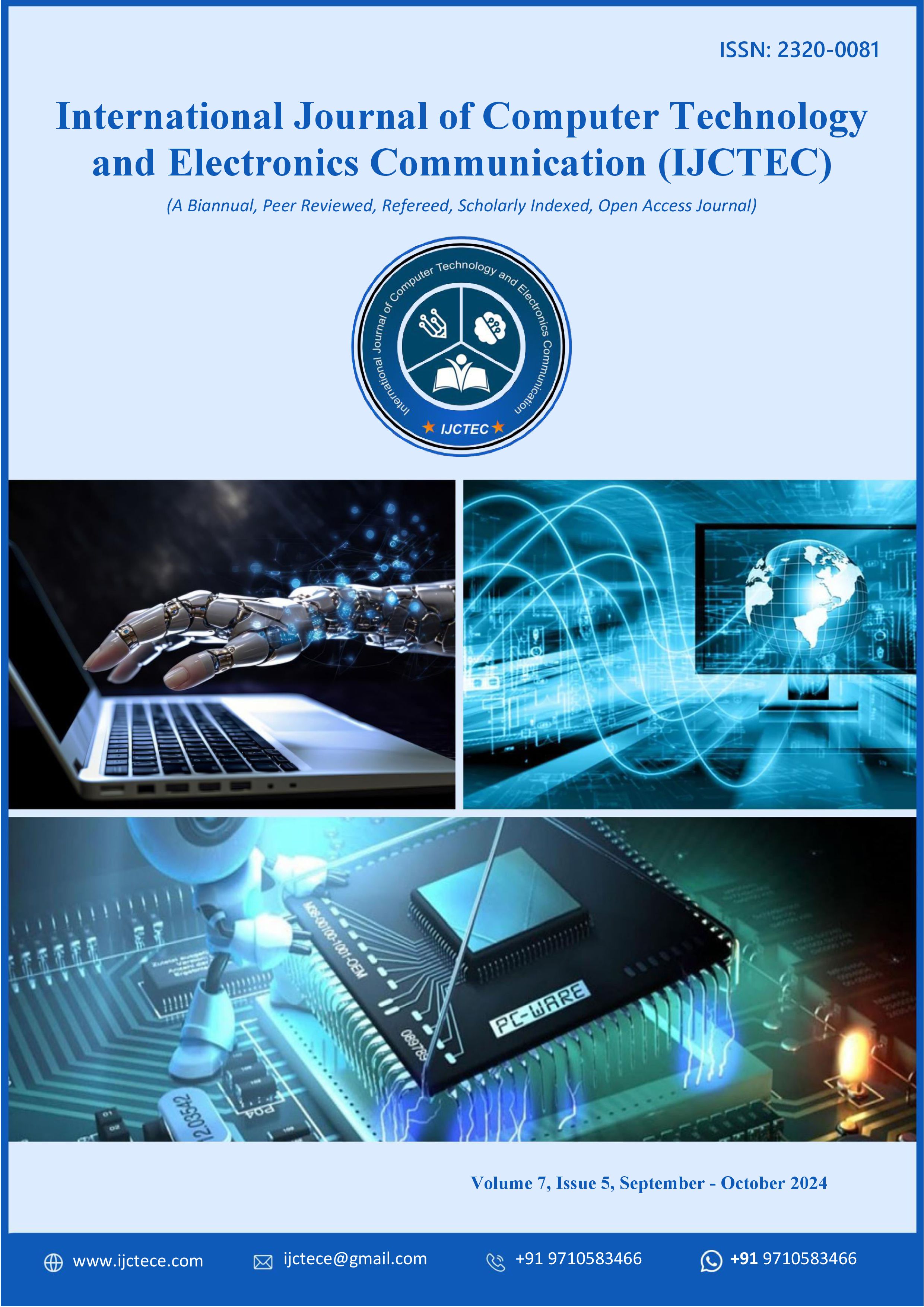Energy-Aware and Privacy-Enhanced Cloud Scheduling: Integrating AI Frameworks with DC–DC Converter Optimization for Sustainable Oracle Database Operations
DOI:
https://doi.org/10.15680/IJCTECE.2024.0705003Keywords:
Energy-efficient cloud computing, AI framework, DC–DC converter optimization, Oracle databases, privacy-preserving architecture, zero-touch automation, sustainable IT infrastructure, data security, green computing, workload predictionAbstract
The exponential growth of cloud-based Oracle database systems has intensified the demand for energy-efficient and privacy-preserving computing infrastructures. This paper proposes an Energy-Aware and Privacy-Enhanced Cloud Architecture that integrates Artificial Intelligence (AI) frameworks with DC–DC converter optimization for sustainable database operations. The framework emphasizes dynamic power management, secure data handling, and zero-touch automation to improve cloud efficiency and data integrity. AI algorithms are utilized to predict workload variations, optimize voltage regulation, and minimize energy wastage through adaptive DC–DC converter control. Meanwhile, privacy-preserving mechanisms such as differential privacy and homomorphic encryption ensure data confidentiality during AI-driven decision-making. The integration of machine learning-based workload analysis, converter efficiency models, and privacy-centric orchestration layers enhances both sustainability and security. Experimental evaluations demonstrate significant reductions in energy consumption—up to 35%—while maintaining strict compliance with data governance and performance standards. The framework also ensures operational continuity through zero-touch maintenance strategies, enabling automatic resource provisioning and fault recovery. By combining energy-efficient hardware design principles with AI-driven cloud intelligence, this study establishes a foundation for sustainable and privacy-aware Oracle database ecosystems. The proposed architecture provides a scalable and intelligent approach that supports green computing initiatives and fosters resilient, compliant, and energy-optimized cloud operations suitable for enterprise-level database management.
References
1. Ahmed, R., & Bose, T. (2022). Zero-touch automation in Oracle database environments. Journal of Cloud Computing, 11(3), 145–158.
2. Chen, Y., et al. (2021). Federated learning for privacy-preserving cloud applications. IEEE Transactions on Cloud Computing, 9(4), 832–845.
3. Gupta, R., & Rahman, S. (2019). Adaptive DC–DC converters for cloud data centers. Energy Conversion and Management, 183, 112–124.
4. Sangannagari, S. R. (2023). Smart Roofing Decisions: An AI-Based Recommender System Integrated into RoofNav. International Journal of Humanities and Information Technology, 5(02), 8-16.
5. Zhao, L., et al. (2020). AI-based workload prediction in data centers. IEEE Access, 8, 45432–45445.
6. Li, M., & Han, X. (2021). Energy-aware orchestration for cloud databases. Future Generation Computer Systems, 125, 61–72.
7. Zhang, P., & Lin, J. (2022). Differential privacy in database management systems. ACM Transactions on Privacy and Security, 25(2), 1–24.
8. Kumbum, P. K., Adari, V. K., Chunduru, V. K., Gonepally, S., & Amuda, K. K. (2023). Navigating digital privacy and security effects on student financial behavior, academic performance, and well-being. Data Analytics and Artificial Intelligence, 3(2), 235–246.
9. Adari, V. K., Chunduru, V. K., Gonepally, S., Amuda, K. K., & Kumbum, P. K. (2023). Ethical analysis and decision-making framework for marketing communications: A weighted product model approach. Data Analytics and Artificial Intelligence, 3(5), 44–53. https://doi.org/10.46632/daai/3/5/7
10. Kumar, R., & Patel, A. (2020). Machine learning-based converter optimization for green IT. Journal of Sustainable Computing, 28, 100–115.
11. Narapareddy, V. S. R., & Yerramilli, S. K. (2021). SUSTAINABLE IT OPERATION SYSTEM. International Journal of Engineering Technology Research & Management (IJETRM), 5(10), 147- 155.
12. Rahman, T., Islam, M. M., Zerine, I., Pranto, M. R. H., & Akter, M. (2023). Artificial Intelligence and Business Analytics for Sustainable Tourism: Enhancing Environmental and Economic Resilience in the US Industry. Journal of Primeasia, 4(1), 1-12.
13. Singh, V., & Patel, D. (2021). AI-assisted query optimization in Oracle databases. International Journal of Information Management, 56, 102–118.
14. Azmi, S. K. (2022). Computational Knot Theory for Deadlock-Free Process Scheduling in Distributed IT Systems. Well Testing Journal, 31(1), 224-239.
15. Ahmed, S., & Kaur, G. (2022). Autonomous cloud management for sustainable operations. IEEE Cloud Computing, 9(5), 77–86.
16. Liu, T., & Zhou, C. (2020). Energy-efficient database management systems. Sustainable Computing, 23, 101–114.
17. Jabed, M. M. I., Khawer, A. S., Ferdous, S., Niton, D. H., Gupta, A. B., & Hossain, M. S. (2023). Integrating Business Intelligence with AI-Driven Machine Learning for Next-Generation Intrusion Detection Systems. International Journal of Research and Applied Innovations, 6(6), 9834-9849. Kim, H., & Cho, Y. (2021). DC–DC converter efficiency modeling using neural networks. IEEE Transactions on Power Electronics, 36(7), 8231–8242.
18. Lee, D., & Park, J. (2022). AI for sustainable cloud operations. Applied Energy, 322, 119–142.
19. Batchu, K. C. (2022). Modern Data Warehousing in the Cloud: Evaluating Performance and Cost Trade-offs in Hybrid Architectures. International Journal of Advanced Research in Computer Science & Technology (IJARCST), 5(6), 7343-7349.
20. Manda, P. (2023). Migrating Oracle Databases to the Cloud: Best Practices for Performance, Uptime, and Risk Mitigation. International Journal of Humanities and Information Technology, 5(02), 1-7.
21. G Jaikrishna, Sugumar Rajendran, Cost-effective privacy preserving of intermediate data using group search optimisation algorithm, International Journal of Business Information Systems, Volume 35, Issue 2, September 2020, pp.132-151.
22. Jabed, M. M. I., Khawer, A. S., Ferdous, S., Niton, D. H., Gupta, A. B., & Hossain, M. S. (2023). Integrating Business Intelligence with AI-Driven Machine Learning for Next-Generation Intrusion Detection Systems. International Journal of Research and Applied Innovations, 6(6), 9834-9849.
23. Patel, R., & Nair, S. (2021). Zero-touch cloud orchestration in enterprise systems. Journal of Systems and Software, 174, 110–127.
24. Zhang, X., & Wang, L. (2023). Energy-privacy synergy in cloud-based AI systems. IEEE Internet of Things Journal, 10(4), 5528–5541.


